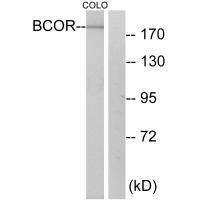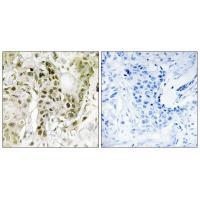

| WB | 咨询技术 | Human,Mouse,Rat |
| IF | 咨询技术 | Human,Mouse,Rat |
| IHC | 1/50-1/100 | Human,Mouse,Rat |
| ICC | 技术咨询 | Human,Mouse,Rat |
| FCM | 咨询技术 | Human,Mouse,Rat |
| Elisa | 咨询技术 | Human,Mouse,Rat |
| Aliases | BCL-6 corepressor; BCoR; BCOR; KIAA1575; |
| Entrez GeneID | 54880; |
| WB Predicted band size | 192kDa |
| Host/Isotype | Rabbit IgG |
| Antibody Type | Primary antibody |
| Storage | Store at 4°C short term. Aliquot and store at -20°C long term. Avoid freeze/thaw cycles. |
| Species Reactivity | Human,Mouse |
| Immunogen | Synthesized peptide derived from internal of human BCOR. |
| Formulation | Purified antibody in PBS with 0.05% sodium azide. |
+ +
以下是3篇与BCOR抗体相关的文献信息及摘要概括:
---
1. **文献名称**:*BCOR Antibody (Clone C-10) is a Useful Immunohistochemical Marker for Clear Cell Sarcoma of the Kidney*
**作者**:Roy A, Kumararatne DS, et al.
**摘要概括**:研究验证了BCOR抗体(克隆C-10)在肾透明细胞肉瘤(CCSK)诊断中的价值,显示其通过免疫组化高特异性识别肿瘤细胞,可作为CCSK与其他儿童肾肿瘤的鉴别标志物。
---
2. **文献名称**:*Recurrent BCOR Internal Tandem Duplication and BCOR Expression in Pediatric Undifferentiated Soft Tissue Sarcomas*
**作者**:Kao YC, Sung YS, et al.
**摘要概括**:该文献利用BCOR抗体检测儿童未分化软组织肉瘤中的BCOR蛋白表达,发现其与BCOR基因内部串联重复突变高度相关,证实抗体在分子分型中的辅助作用。
---
3. **文献名称**:*BCOR Overexpression in Myxoid Liposarcoma: A Potential Diagnostic Pitfall*
**作者**:Ko JS, Rubin BP, et al.
**摘要概括**:研究通过BCOR免疫组化分析黏液样脂肪肉瘤,发现部分病例存在BCOR异常表达,提示需结合分子检测以避免误诊,强调了抗体应用的局限性及优化策略。
---
这些文献均聚焦于BCOR抗体在肿瘤病理诊断中的实际应用,涵盖特异性验证、分子分型支持及诊断陷阱分析。如需具体文章链接或补充,可进一步提供数据库检索信息。
The BCOR (BCL-6 corepressor) antibody is a tool used to detect the BCOR protein, a transcriptional corepressor involved in epigenetic regulation. BCOR interacts with BCL-6 and other proteins to form chromatin-modifying complexes, such as the Polycomb repressive complex 1.1 (PRC1.1), which mediates gene silencing through histone ubiquitination. This protein plays a critical role in embryonic development, hematopoiesis, and cell differentiation.
BCOR antibodies are widely utilized in research and diagnostics to study BCOR expression patterns and abnormalities. Mutations or genetic rearrangements in BCOR are linked to various cancers, including clear cell sarcoma of the kidney, undifferentiated sarcomas, and hematologic malignancies. Overexpression or altered BCOR expression can serve as a biomarker for these tumors. Additionally, BCOR mutations are associated with rare genetic disorders like oculofaciocardiodental (OFCD) syndrome.
In practice, BCOR antibodies are applied in techniques like immunohistochemistry (IHC), immunofluorescence (IF), and Western blotting to assess protein localization and expression levels in tissues or cell lines. Validation of antibody specificity is crucial, as cross-reactivity with related proteins (e.g., BCORL1) may occur. Researchers prioritize antibodies validated via knockout controls or mass spectrometry to ensure reliability. Commercially available BCOR antibodies aid in unraveling the protein’s role in disease mechanisms and developmental biology.
×